Part 3: Kratom’s path across the US is marked by deception and secrets
The story was originally published by the Tampa Bay Times with support from our 2023 National Fellowship.
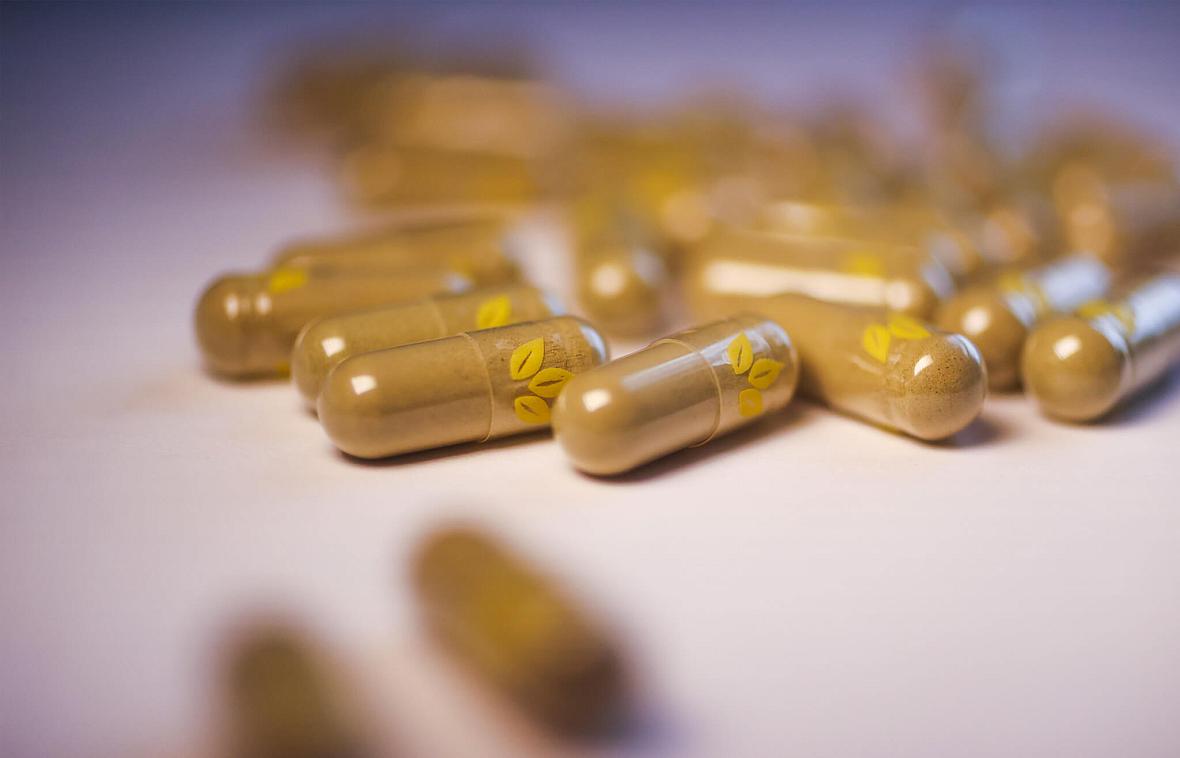
The kratom trail spanned thousands of miles before it ended inside Jeremy Franka’s Broward County home.
Two bags of the substance were near the 35-year-old’s lifeless body in a backpack in his bedroom. One held 120 capsules of O.P.M.S. Silver, a popular kratom product that has been linked to multiple overdose deaths in Florida.
The other bag, with the same distinctive three-leaf emblem, was empty.
The trail starts in the verdant fields of Indonesia, where farmers pluck leaves from native evergreen trees. Once in the United States, kratom zigzags across the farmlands of the Deep South, through the plains of southeastern Colorado, to the sprawling suburbs of Atlanta — cloaked in secrecy at every turn. It can make nearly a dozen stops, where it is blended, cooked and packaged before powdered and potent versions land in gas stations, convenience stores and smoke shops.
By the time these products reach Florida consumers like Franka, suppliers and manufacturers have taken elaborate measures to evade regulators and avoid detection, a Tampa Bay Times investigation has found.
Hundreds of businesses make up America’s kratom industry. The Times traced the steps along the trail, focusing on O.P.M.S., one of the country’s most popular names. It has roughly a dozen kratom products on the market, ranging from dried leaf powders to potent liquid shots.
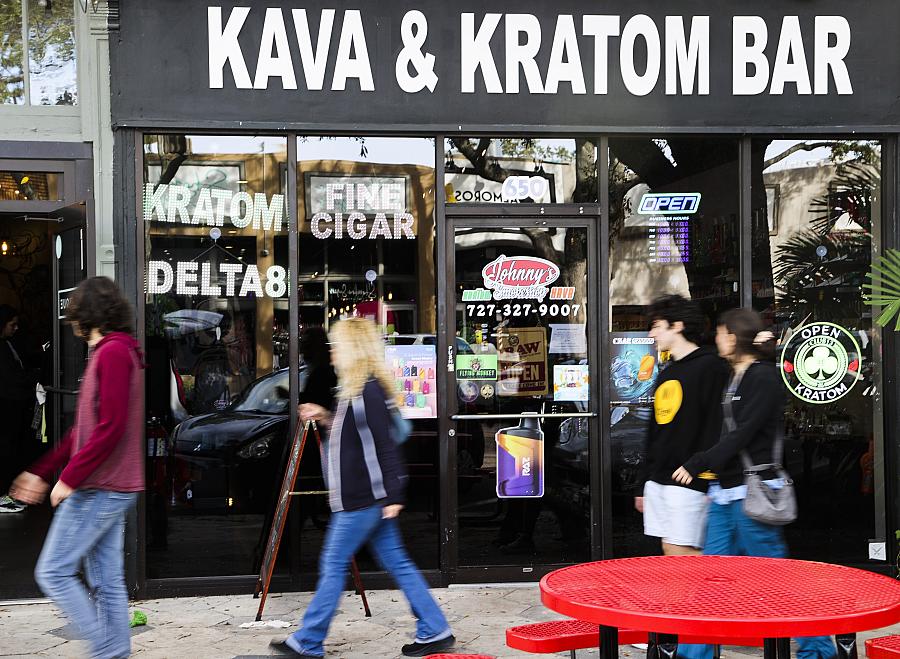
Before kratom products reach stores like this one on St. Petersburg’s Central Avenue, they have likely traveled thousands of miles, from the fields of Indonesia to manufacturing and packaging facilities in the U.S.
DIRK SHADD | Times
Reporters analyzed internal company documents, import data, court records, business filings and inspection reports to piece together a first-of-its-kind examination of kratom’s mysterious supply chain.
The psychoactive herb has grown in popularity over the past two decades with millions of people estimated to use it nationwide.
Kratom is legal to possess and consume in most states. But the U.S. Food and Drug Administration has recommended banning it and has stopped hundreds of shipments from entering the nation’s ports.
Amid the threat of regulatory oversight, kratom brands like O.P.M.S. depend on a labyrinth of corporations and limited liability companies that enable key supply chain sites to operate under the radar.
Two dozen entities and trade names connected to the O.P.M.S. brand have been created since 2012, according to corporate filings. The web of companies has the effect of blurring who is in charge and where products are made.
Executives behind the O.P.M.S. brand did not respond to repeated interview requests or detailed findings and questions sent in writing. The Times received five letters from attorneys representing entities and people tied to the O.P.M.S. brand that said their clients would not be commenting.
Daniel Delnero, an Atlanta-based attorney representing the company that holds O.P.M.S. trademarks, said all employees and contractors for the business are bound by confidentiality agreements.
The Times identified a supplier who billed a lab connected to O.P.M.S. for a kratom order during a time when no shipments of the herb officially entered the United States by cargo ship. The supplier illegally brought kratom into the country labeled as fertilizer.
He wasn’t the only one sneaking it in. After the FDA issued an alert that allowed inspectors to block kratom shipments, imports designating the substance as cargo dried up nationwide for years, a Times analysis of shipping data found, even as companies sold more and more.
Other importers have taken a different approach, records and interviews show. They’ve declared that kratom — tons of it — is not meant for human consumption, sidestepping the FDA, which regulates much of what we put into our bodies.
Once on land, employees and contractors guard the brand’s secrets — at times unwittingly.
The owners of a trucking company carrying kratom through Alabama, a state that bans possession of the substance, said they were informed that their cargo was vitamins, not something that could be seized if discovered.
Workers in Georgia said they cut off and destroyed shipping labels, burying any trace of stops along the kratom trail.
At a rural Colorado location hundreds of miles from any major city, fine kratom dust numbed the mouths of workers who experienced opioid-like withdrawal symptoms: Exhaustion, nausea, twitching. Employees said they weren’t briefed on what substance they’d be handling or the effects it could have on them.
They told a regulator who came for an inspection that the factory handled a harmless herb, not one that has been tied to thousands of fatal overdoses across the country and nearly 600 in Florida over the past decade.
Workers from Colorado to Georgia were coached on what to do if FDA regulators arrived at their workplace and asked about deaths, a 2022 training plan obtained by the Times shows.
The document outlined possible scenarios between an inspector and worker.
“Did you know your product has killed people?” the inspector asks.
“Our understanding is that the product is safe and legal,” employees were supposed to answer.
A company wide email should go out when the inspector arrived, according to the protocol. Periodic updates would be sent. Workers should keep talk minimal.
“Remember,” the document instructed, “Less is MORE.”
Spinning up little LLCs
Some of the tactics in the kratom business may sound familiar. They mirror the strategies that were used for another controversial product — synthetic cannabis compounds, or “Spice.”
More than a decade ago, U.S. officials spotted a trend. Importers, court records show, were slipping Spice into the country from China by calling the white chemicals “cosmetics” or “sodium.” Products found at gas stations promised Spice was “herbal incense” or “not for human consumption.”
But a cascade of regulation disrupted production. Several states banned early versions of the synthetic compounds found in Spice, and federal legislation was not far behind.
Distributors would face wrongful death lawsuits and federal smuggling charges. A handful migrated to a burgeoning industry: kratom.
Ken Howard remembers the day he and other Georgia Bureau of Investigation agents entered a lab in a Marietta shopping center.
It was July 10, 2012, one day after President Barack Obama signed the Synthetic Drug Abuse Prevention Act. The Spice compounds that the agents seized inside the business were not yet banned by the Georgia Legislature, but investigators had been granted power to confiscate them.
A witness at the scene told agents that they thought the business was making potpourri.
The lab was connected to a man investigators believed to be a major manufacturer and distributor of Spice — Peyton Palaio. At the age of 25, his reach stretched across the southeast, from Florida to North Carolina, and as far north as Wisconsin, according to Howard.
“He wasn't the only guy doing this, but he was the one doing it on a mass scale,” Howard said. “He recognized pretty quickly, ‘There's a gray area here to generate a tremendous amount of income.’”
Howard said the operation was constructed through layer after layer of limited liability companies. He was sure Palaio was in charge, though on paper, it looked like parts of the enterprise belonged to other operators.
“All these guys were intertwined, intricately connected, working together, spinning up little LLCs. I looked at them during my investigation as all one organization, basically,” Howard said. “Palaio just had more sense than the rest of them, so he was at the top of the food chain.”
Agents believed the lab was involved in part because they found an invoice, which listed suspected Spice products recently shipped from the lab, in a nearby dumpster, according to an affidavit for a search warrant filed in court.
A month later, the parents of a high schooler who drowned after taking Spice filed a wrongful death lawsuit against Palaio and alleged he was the distributor. He denied any involvement through his attorney, who told a reporter in August 2012 that Palaio had “absolutely no connection” to the product. The case was dismissed.
Palaio never faced Spice-related charges. Howard said the Georgia Bureau of Investigation recommended prosecution, but U.S. attorneys didn’t pursue it.
Spice wasn’t the only substance authorities found in the Marietta lab, according to search warrant documents.
“He had a lot of kratom there,” Howard said.
“He was making a product, ‘Kratom OPM,’ he called it,” he added. “To me, obviously, it was a nod to opium — to get your attention.”
Within a year, “Kratom OPM” was sold as “O.P.M.s. Kratom.”
The Times could find no evidence that O.P.M.S., or the phrase behind its acronym, “Optimized Plant Mediated Solutions,” is a registered company anywhere in the United States.
It’s a brand and brand only.
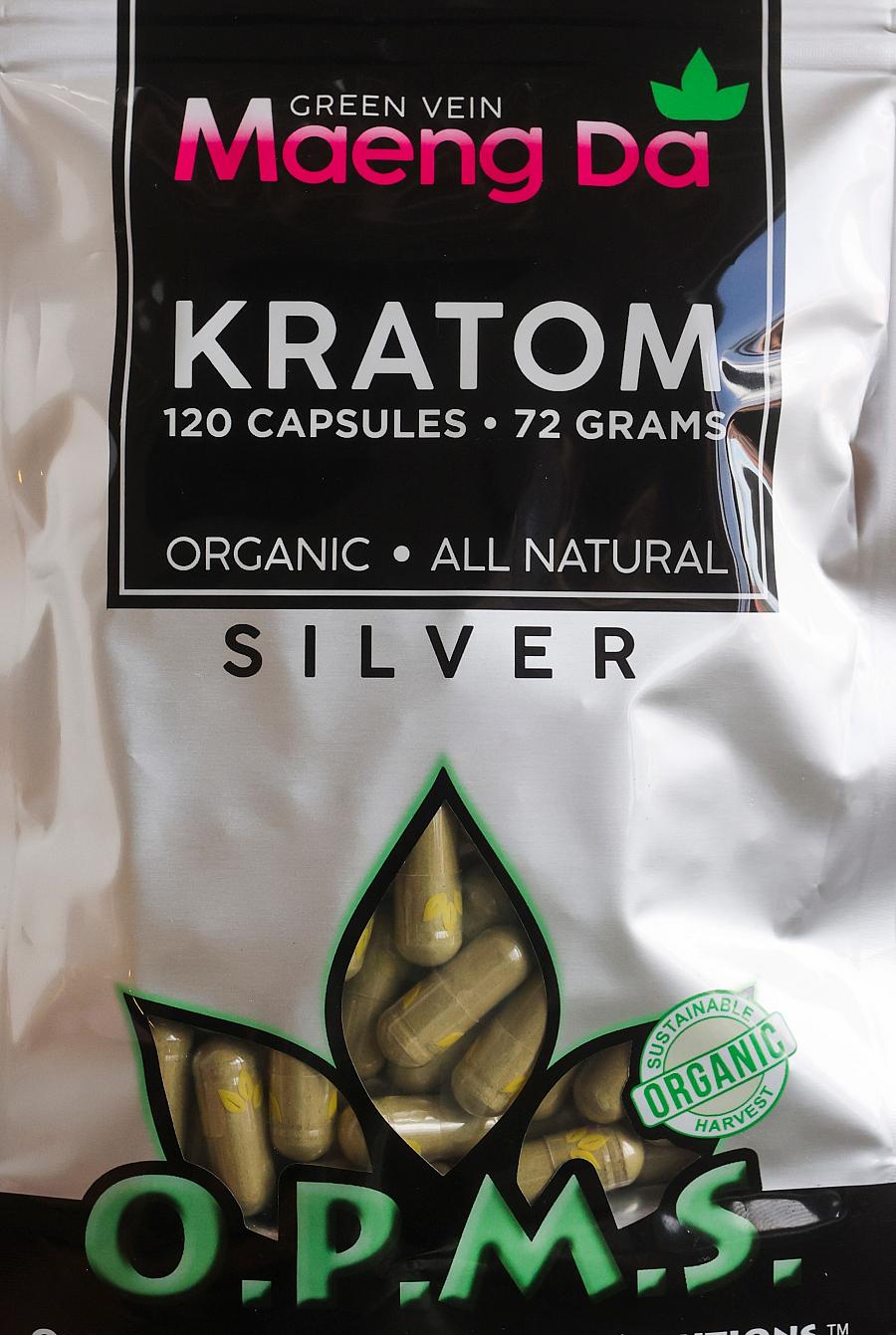
This is O.P.M.S. Silver, a popular kratom product that has been linked to multiple overdose deaths in Florida. The Times found no evidence that O.P.M.S. is a registered company.
DIRK SHADD | Times
The very construction of it is like a set of nesting dolls: company after company after company.
The brand relies on at least 16 companies and eight trade names, the Times found.
One company registered in Wyoming holds trademarks. Another receives incoming kratom in Georgia. Another in Colorado makes extracts. Another Wyoming company furthers kratom-related research.
For years, at least four entities were overseen by parent company Olistica Life Sciences Group, according to internal company organization charts and a 2020 employee handbook. The company also has a CBD business.
Its main kratom brand was O.P.M.S., said Natalie Raulin, a former marketing coordinator at Olistica who handled cannabis products.
Twelve companies, including all of the Olistica entities, were set up in Wyoming, with the help of registered agents or attorneys, which obscures ownership and operation locations from the public record. Wyoming offers some of the broadest privacy measures for company executives, according to experts in corporate law. Such protections, experts said, can help executives who want to remain anonymous.
Palaio’s name isn’t on most of the official company filings, save for a few business documents from several years ago. But kratom vendors, former business partners and internal company organization charts identify Palaio as a company leader. Other documents, including deeds, property filings and law enforcement records reviewed by the Times connect him to individual entities along the O.P.M.S. supply chain.
Palaio was the president of a company that bought 36 acres of Colorado farmland, where a large factory making O.P.M.S. extract products would later be built, deed records from 2016 and 2019 show. (The property was sold to another company managed by Palaio’s 93-year-old grandfather, who died earlier this year.)
In 2021, Palaio sent the manager of a kratom import company an outline of operations at Olistica, so the company could see what “our organization is involved in,” emails included in court filings show. Palaio talked to the manager about accelerating a “market takeover,” according to the emails.

A decade ago, Georgia Bureau of Investigation agents believed Peyton Palaio, above, to be a major manufacturer and distributor of spice. They also found something else in the Georgia lab they connected to him: lots of kratom.
During interviews with the Times, nine current and former workers in Colorado and Georgia mentioned Palaio by name as the chief executive of their companies. Some said his visits to the Colorado factory were treated with an air of reverence, and management referred to him as the CEO or head of the company.
“He came through in an Italian leather coat, Italian leather shoes, with a silk shirt,” said Pat Appel, who worked there until July. “In this dirty, nasty factory.”
Last year, a wrongful death lawsuit was filed against O.P.M.S. in Georgia. In October 2022, an amended complaint in the case alleged Palaio was behind the brand. It also named Olistica among the defendants.
Around the same time, staff in Georgia were told Palaio was stepping down as CEO, according to three former employees. Mark Jennings, a longtime associate of Palaio who is also named in the lawsuit, took over the role. (When sent a list of findings and questions weeks ago by the Times, attorneys for both Palaio and Jennings said the reporting contained errors but provided no examples.)
Until earlier this year, a LinkedIn page said a “Payton P.” was the former chief executive officer of Olistica Life Sciences Group. (Palaio signed emails using that spelling of his name, exhibits filed in court show.) The profile has since been removed. So has the one for Olistica, and the one for its new company name, Centralized Services.
A kratom vendor has addressed Palaio as “the bezos of the field,” text messages and court filings from a 2021 case show. The records allege Palaio himself has said he operates “the largest kratom business in the U.S.”
<--img-4-->
The trail begins
Long before ground kratom leaves get packed into capsules and turned into extracts, they must be harvested from the branches of a tropical evergreen tree halfway around the world.
Companies behind O.P.M.S. and the vast majority of other kratom businesses purchase leaves from Indonesian farms on the island of Borneo, according to a company production record and purchasing documents filed in court.
It’s here that the kratom trail begins.
Braving the early morning heat, farmworkers in the region of West Kalimantan pick large leaves from a dense canopy of trees. They pile the leaves onto large cloth sheets before wrapping them into bundles to be taken to dry.
Roughly 8 in 10 residents harvest kratom in Kapuas Hulu, a collection of villages that hug the winding Kapuas River. Across Indonesia, the number of kratom farmers has swelled to an estimated 250,000. Locals consider it a dependable crop and more lucrative than the country’s well-established rubber industry.
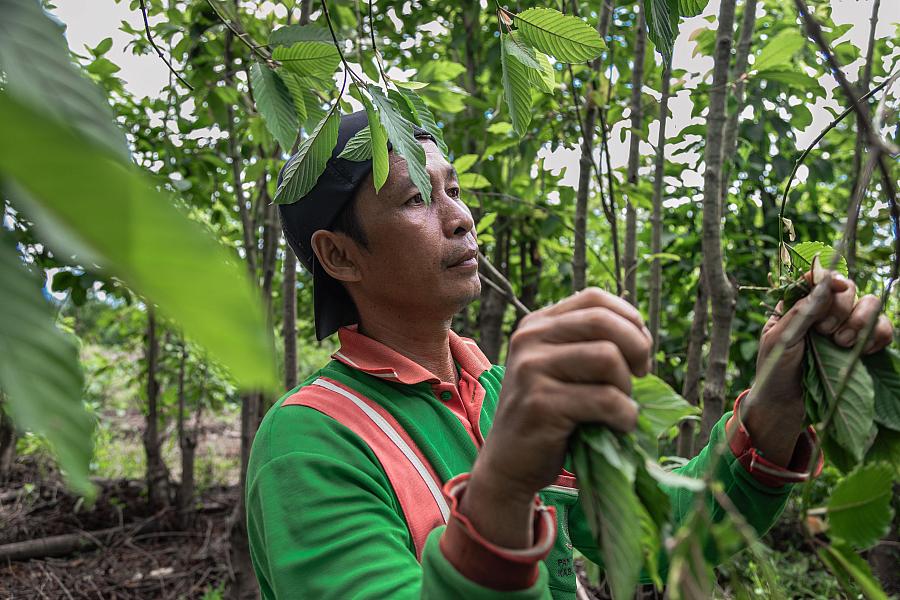
A farmworker harvests kratom in Indonesia’s West Kalimantan region in October. The vast majority of U.S. kratom businesses buy leaves from Indonesia.
IRENE BARLIAN | Special to the Times
Once the fronds become brittle, they’re crushed and transported to Pontianak, a processing hub for kratom. There, large factories for manufacturing and testing have been erected.
Workers, covered in green dust, mill and grind the leaves into a fine powder that gets tested for heavy metals and potency. In some cases, the ground leaf is treated for bacteria like salmonella.
Kratom suppliers range from small, family-run farms dealing loosely with U.S. buyers online to sophisticated operations that handle their own high-tech testing and manufacturing.
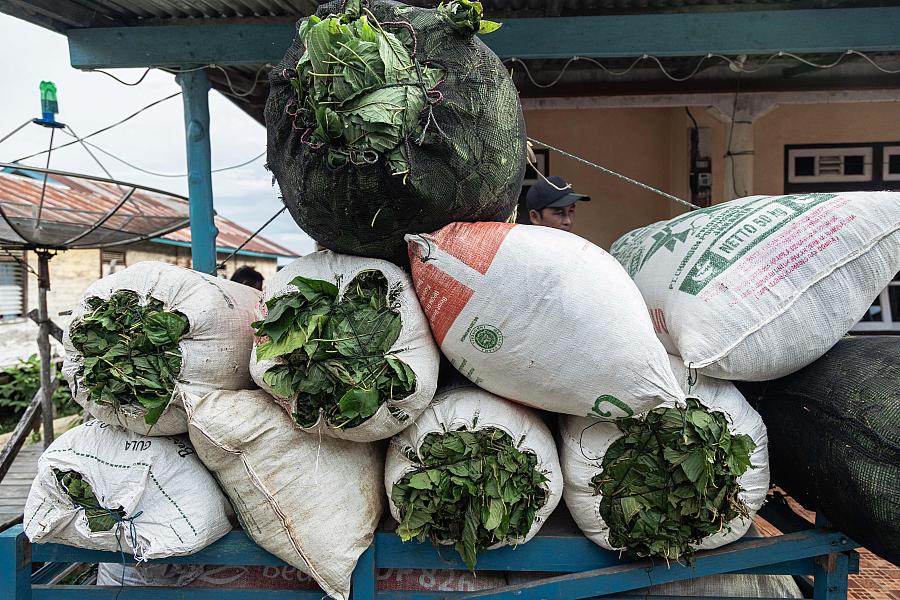
Once kratom leaves are harvested, they are dried and transported to the port city of Pontianak, a processing hub in the country.
IRENE BARLIAN | Special to the Times
Despite the industry’s boom, kratom is a sensitive topic. The Times applied for a journalist visa to report on the industry, but the Indonesian government denied the request without explanation. The newsroom hired a local freelance photographer and interpreter instead.
Kratom is legal to grow, process and export in the country. A potential ban on cultivating and exporting it was tentatively proposed for 2024. But earlier this year, the Indonesian president’s chief of staff and the country’s trade minister assured the crop would remain legal.
In the U.S., demand is rising: More than 4,000 tons a month fuel a $1.5 billion industry, according to an Indonesian news report and industry estimates.
After kratom powder is tested, it’s transported to cities like Jakarta and Surabaya. The herb is loaded onto mammoth cargo ships to begin its monthlong journey to America.
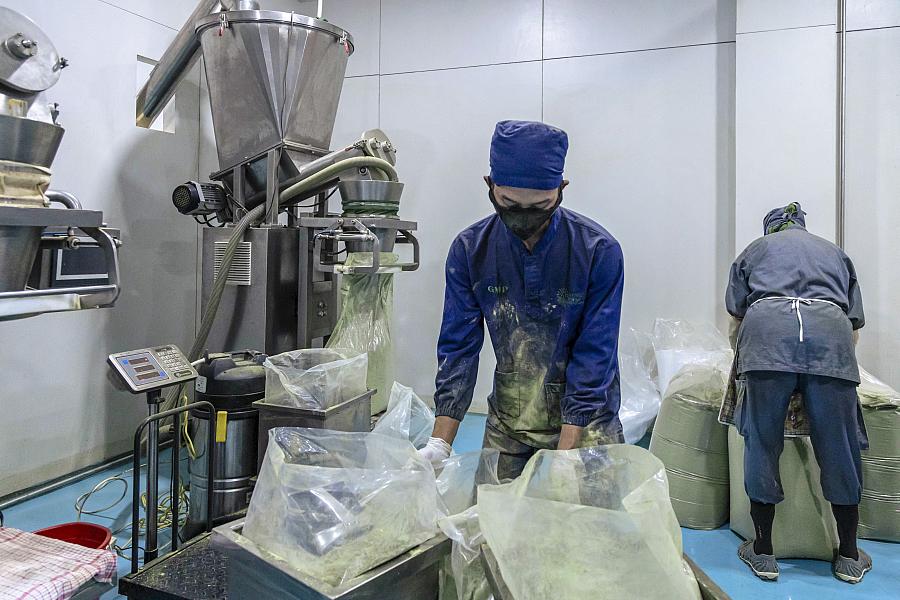
Workers in Pontianak fill large bags with kratom powder. The herb is legal to grow, process and export in Indonesia.
IRENE BARLIAN | Special to the Times
Over Zoom interviews with the Times conducted through an interpreter, several Indonesian suppliers said they sometimes don’t know where their kratom ends up, or the U.S. brand it gets sold under. One supplier declined to name his American partners.
Once the ships dock at a U.S. port, loads of kratom encounter what can be a daunting challenge: getting through customs.
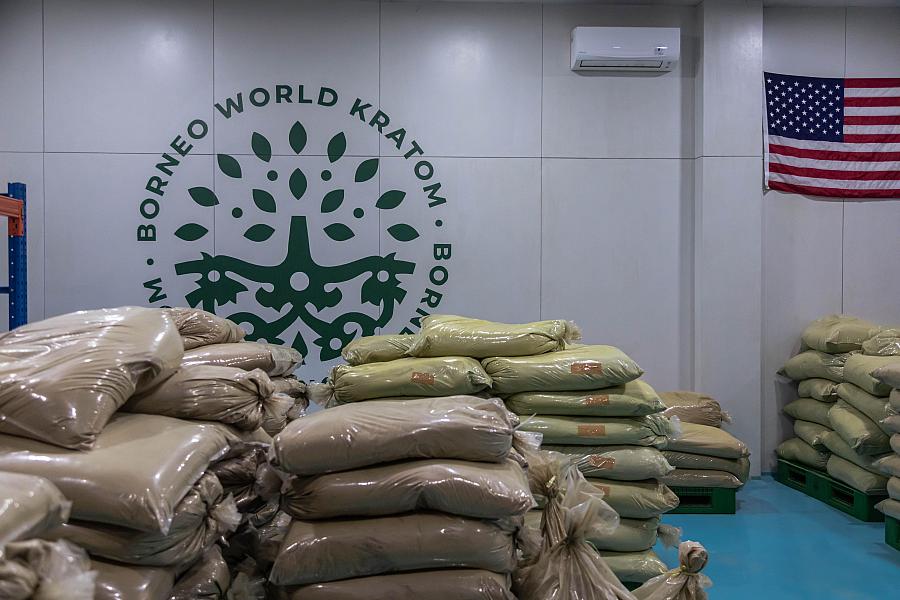
Kratom powder sits at a factory in Pontianak in Indonesia. Suppliers in the country range from small, family-run farms to larger-scale operations.
IRENE BARLIAN | Special to the Times
Not for human consumption
Kratom enters the United States through ports all around the coastline. Oakland, California, by far, is the most popular destination, accounting for nearly half of all shipments, a Times analysis shows. The second is Tampa, where 14% of kratom imports arrive.

Fourteen percent of all kratom imports that enter the U.S. come through the port of Tampa.
DIRK SHADD | Times
In early 2014, the FDA issued an import alert for kratom, notifying its staff and the public that the agency believed the substance could be unsafe.
The alerts aren’t all-out bans, but kratom shipments can be blocked by federal officials. Confiscated kratom, if ultimately rejected by the FDA, is either destroyed or turned away, costing buyers sometimes hundreds of thousands of dollars.
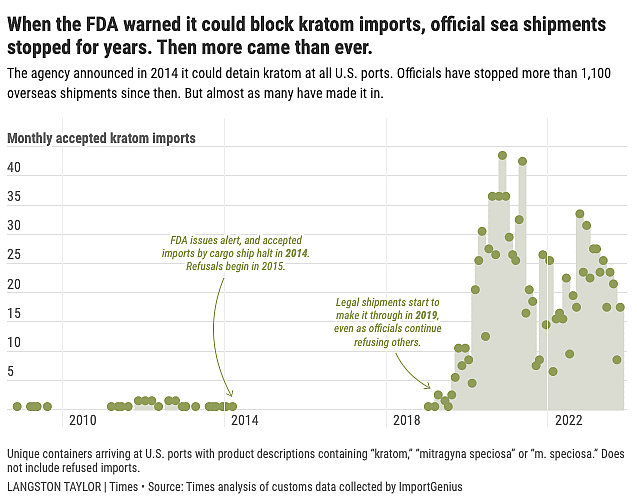
After the 2014 alert, the agency began to aggressively turn away kratom shipments — hundreds of them, the Times found. Over the next four years, no kratom officially entered the United States by cargo ship.
But, somehow, it still got through.
By early 2019, the industry placed its value at more than $1.1 billion. An estimated 5 million people used kratom nationwide.
“Kratom shipments were being simply misdeclared,” said Richard Chiang, a consultant and former import compliance manager for the FDA.
Kratom suppliers, he said, would call the cargo “potpourri or some other product that wouldn’t fall under FDA jurisdiction.”
Importers can face criminal charges for misrepresenting their products, but it’s rare. In July, Sebastian Guthery pleaded guilty in federal court to a charge related to illegally importing a 10-ton kratom shipment five years ago by using an invoice that labeled it as fertilizer.
That year, his company sent multiple invoices for kratom orders addressed to a Georgia lab that’s been used by the makers of O.P.M.S., according to invoices filed in court. (It was the same location where Spice was seized in 2012, search warrant records show.) The business that placed the orders paid him for at least four more.
U.S. attorneys had accused Guthery and his import company of conspiring to commit fraud by misidentifying other kratom shipments — calling them kelp or seaweed.
In total, prosecutors alleged Guthery falsely identified more than 44 tons of kratom as other products, according to court records. Guthery used multiple shell companies and points of entry, his indictment said, “to avoid detection by government inspectors.”
Guthery said at the time that many kratom importers were operating that way.
"Unfortunately, just because it's status quo, doesn't make it right or legal,” Guthery told the Times.
More recently, officials have refused fewer kratom shipments than they’ve allowed in, records show.
Hundreds of tons of kratom enter the country each month labeled as “Mitragyna speciosa,” its scientific name, or an abbreviation. Roughly 20% of the time, importers declare that it’s “not for human consumption.”
Such declarations happened as recently as last month at multiple ports around the country. Thirty tons of kratom, for example, entered through Norfolk, Virginia, with the not-for-consumption label.
If customs brokers believe an incoming shipment isn't regulated by the FDA, experts said, they may not pass it along to the agency's inspectors at the port. In those instances, the FDA's reviewers might never see it.
U.S. kratom companies often rely on import businesses to sign to receive the goods. For U.S. vendors, the signature adds a layer of protection. With someone else’s name on the shipping records, it becomes that much harder to identify where it’s headed next.
A Georgia buffer
The deliveries arrived from all over: California, Nevada, Florida.
Exactly where they came from was unclear to the workers. They figured the boxes had been sent from whoever picked up the kratom powder after it entered ports around the country. But they could only see the state and business name written on the shipping paperwork. Everything else was obscured.
These workers were stationed in a pillared, ecru-colored warehouse, tucked along a business park road roughly 20 miles outside Atlanta. It was the first stop along the kratom trail for bulk powder coming into Georgia that would become O.P.M.S. products, according to two employees who left the brand’s Georgia processing facilities this year.
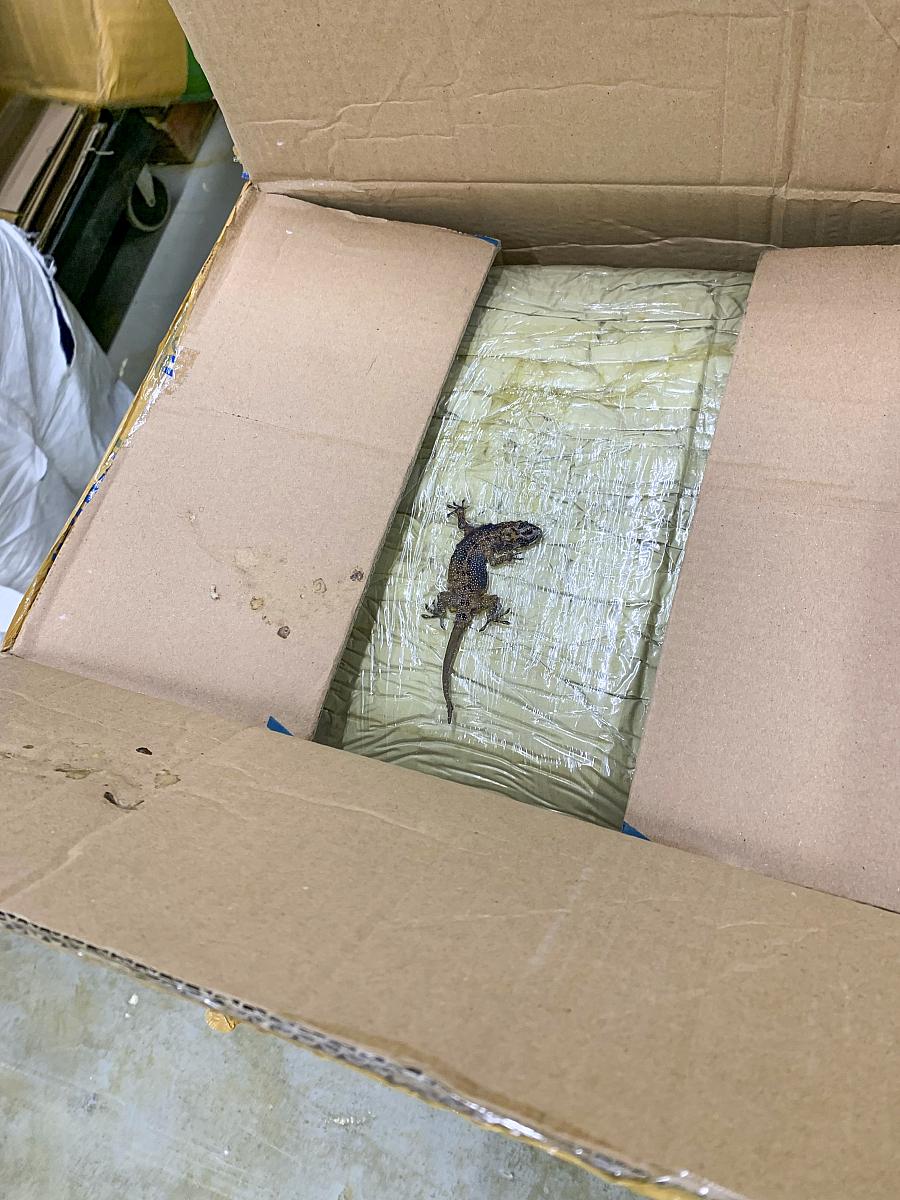
A dead lizard was found inside a raw kratom powder shipment in Georgia.
Advanced Nutrition worker
The warehouse acted as a buffer, two workers said.
Bulk kratom deliveries weren’t sent directly to Atlanta-area manufacturing locations, documents outlining the company’s supply chain show. They stopped at the warehouse, which complicated the kratom’s path but limited the number of outside truckers who knew where the herb was processed, according to the workers.
The kratom shipments that arrived in Georgia sometimes collected debris along the way, the workers said. They opened boxes to find a glove, a used cigarette, a dead lizard.
Samples went to a botanical testing company in Michigan, messages sent on a company app earlier this year and obtained by the Times show. The lab analyzed the powder for heavy metals and bacterial contamination. Analysts also checked alkaloid levels, including kratom’s best-known chemical compound, mitragynine, which affects potency.
With an initial round of testing complete, the kratom’s path diverged.
Kratom that would become raw powder capsules headed to a lab in Texas to eliminate bacteria, according to workers and the sterilization company. Then, it returned to the Georgia warehouse.
Powder that would be turned into potent O.P.M.S. extracts went to Colorado, three workers said.
If truckers carrying the kratom powder asked, warehouse employees would say the shipments were tea or supplements. Similar lines were adopted by workers at other Georgia facilities when first responders or drivers delivering supplies inquired about operations, according to interviews and a fire department incident report.
Employees found the secrecy in their workplace culture odd. Blind bills of lading, which mask the identity of a supplier from a customer, were used to carry kratom from one stop on the supply chain to another.
One document, obtained by the Times, shows a 22-pallet package shipped blind from the Georgia warehouse to the Colorado site in 2022. The product is described only as “Gen Merchandise.”
When the kratom powder arrived, the shipping contract shows, workers receiving it couldn’t tell where it came from.
Don’t ask
Forty minutes from the borders of Kansas and Oklahoma, just outside a remote town of less than 1,400 people, a glistening factory juts out against the gaping southeastern Colorado horizon.
Locals call it “The Hemp Farm.”
It once was — but for years, it has served as a pivotal stop on the kratom trail, where O.P.M.S. extract products are boosted to give them their punch.
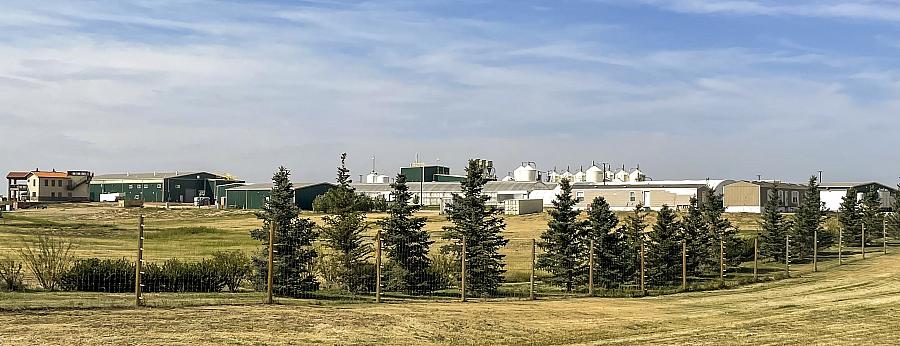
Jordan Process in Springfield, Colorado, has served as a key stop on the O.P.M.S. kratom trail for years. The factory helps transform raw kratom powder into potent extracts.
HANNAH CRITCHFIELD | Times
Green bricks of kratom powder arrived at the Springfield factory by the truckload.
Yet no one in management at the Jordan Process factory talked about what the substance was, six current and former workers told the Times. Supervisors typically referred to it as “product B” or “flour.” But they didn’t give it a formal name.
Weeks into his job, Duane “Tom” Hogue loaded the fine green powder into sleek, colossal mills still unsure what it would eventually become.
The 46-year-old production technician found the company’s “don’t ask” culture perplexing since no one could answer questions anyway. Everyone he knew who worked there had signed nondisclosure agreements.
Hogue learned more during an interview for a job within the factory’s quality control division.
“You know what you’re making, right?” Hogue remembered a supervisor telling him. “It’s kratom.”
Employees said management disclosed that the facility was named after Palaio’s brother Samuel Jordan Palaio, who went by his middle name. They said the company, set up as an Olistica subsidiary, held events to commemorate Jordan, who died of an overdose involving heroin in 2015. Employees recalled seeing Peyton Palaio onsite.
Inside the factory, workers heated raw powder multiple times and mixed it with a variety of chemicals, including ethyl acetate, to purify and boost the kratom. The chemical is commonly used to strip caffeine from coffee beans and to remove nail polish.
During the final steps, the mixture was divided into lines: gold and black. It was a reference, workers across the supply chain believed, to the popular O.P.M.S. Gold and Black extract products, the brand’s most potent.
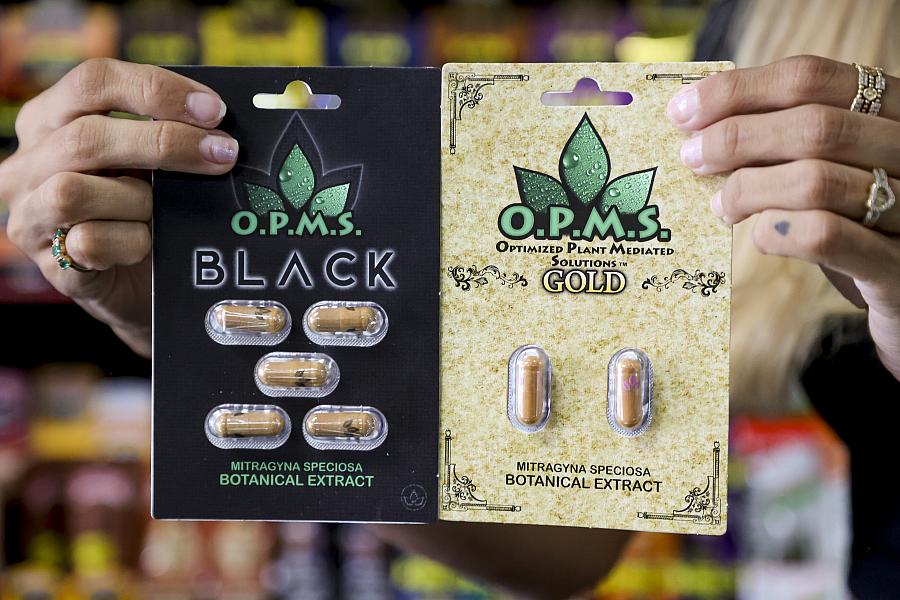
Workers at Jordan Process believe they were making O.P.M.S. Gold and Black, the brand’s most potent extract products, seen here at the Smoke Shop Factory in Tampa.
LUIS SANTANA | Times
The process was dirty. Workers said they were sometimes asked to dump water that contained chemicals on property grounds, which dyed the soil a Martian orange.
Clayton Skinner, an Atlanta-based attorney representing Jordan Process, said that employees did not dump wastewater and that the company has a multimillion-dollar treatment system. The Times obtained photos taken last year by two different workers of discolored water and sludge on factory property.
The job also came with risks. A 30-year-old worker was sprayed in the face with ethyl alcohol last year after a valve popped on the tank she was refilling, emergency dispatch calls show.
With the consistency of baby powder, kratom dust could slip through the filters of the workers’ respirators, according to four Jordan Process employees who handled the substance. It numbed their lips, mouths and throats and made their noses run green.
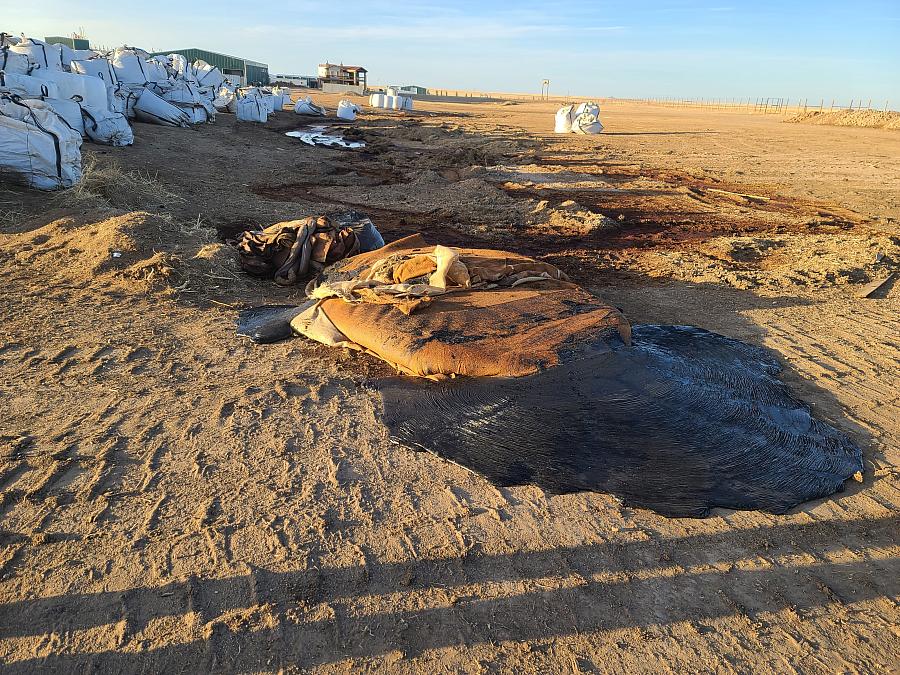
A black substance spills onto the ground outside Jordan Process. The kratom extract facility can be seen in the background.
Jordan Process worker
But it was time off that some workers like Pat Appel came to dread.
That was when the exhaustion set in. The stomach problems. The restless legs.
It was a familiar sensation to Appel, who was in recovery from heroin addiction.
He said it felt like withdrawal.
Appel said his bosses didn’t explain the opioid-like qualities of the powder he was breathing.
“I feel like I was put at risk,” he said.
One employee told the Times he experienced seizures after starting at the factory. Another said he pulled over to vomit multiple times on the way home after his 12-hour shifts. Both wondered if the powder played a role.
A third worker wrote to the federal Occupational Safety and Health Administration in February, complaining about factory conditions.
“Employees are becoming intoxicated due to the alkaloids in the kratom that we produce,” the worker wrote. “Employer does not share info about effects of this substance.”
Federal regulators asked the factory’s manager to explain.
In its response, the company acknowledged workers were handling kratom. Jordan Process noted that OSHA doesn’t have rules regulating exposure to the substance and said there weren’t any “known acute or chronic toxicity concerns.”
Candy Mason, the company’s operations manager, told regulators that staff received adequate training and protective equipment. She provided photos of a safety sheet for mitragynine, kratom’s main chemical compound, that she said was on-site.
It said the product was “for research use.”
OSHA closed the complaint without taking action.
Two months later, an inspector from Colorado’s state environmental agency arrived. During the visit, something curious happened: The company maintained it handled a different herb, the benign “uncaria gambir,” according to the inspection report. That substance doesn’t appear on any regulators’ watchlist. In fact, it’s highly uncommon in the U.S.
Uncaria gambir has entered the U.S. by sea only a handful of times since late 2006, the earliest year import records are available. The records don’t show any shipments of the herb, which is native to Southeast Asia, since September 2022.
Skinner, the factory’s attorney, said Jordan Process had manufactured products with uncaria gambir extracts, along with several other botanicals, but did not say when.
Kratom isn’t mentioned anywhere in the state’s inspection report.
But the kratom kept moving. And workers told the Times they were processing it the whole time. Kratom extract powder was boxed and hauled to Georgia.
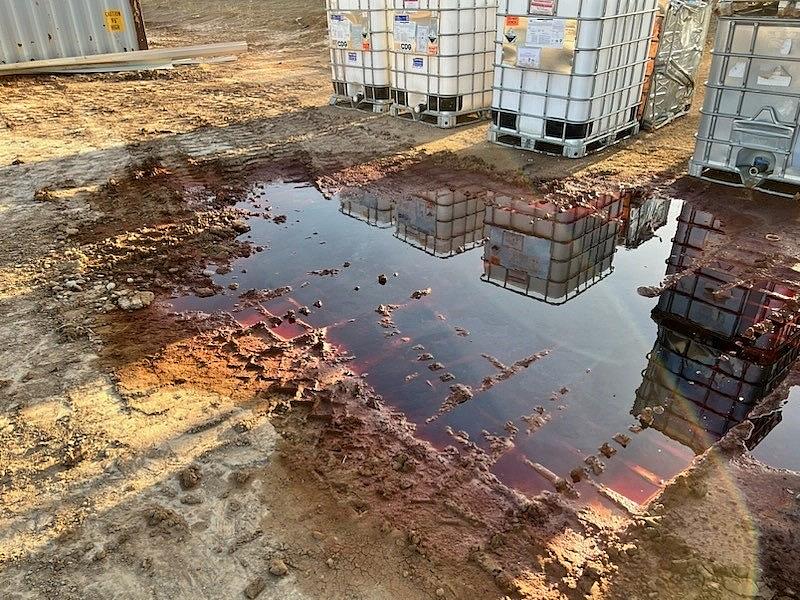
Jordan Process employees said they were sometimes asked to dump water that contained chemicals on property grounds.
Jordan Process worker
Then, in late summer, Jordan Process abruptly laid off most of its workers and announced it planned to switch back to hemp. The move came roughly three months after a wrongful death lawsuit named Jordan Process as a defendant and listed its Colorado address, effectively outing its location along the kratom trail.
Chase Krinard, a maintenance employee at Jordan Process, told the Times in September that the factory’s remaining staff would work through the last of the kratom powder over the coming months.
Until then, the products would continue along their path.
Could not advise a company name
Back in Georgia, kratom shuttled between dove-colored buildings in Alpharetta and Marietta. No business signs could be seen.
But they were part of Advanced Nutrition, another company connected to the O.P.M.S. brand.
To employees, they were simply known as “1100” and “1199,” their street numbers. To first responders, they were a source of confusion.
“ADDRESS IS THE SITE NAME?” one dispatcher wrote as Marietta police responded to an accidental 911 call at one of the buildings in June 2021.
“CALLER COULD NOT ADVISE A COMPANY NAME,” another wrote after a car in the parking lot was stripped that same month.
“COMMERCIAL/BUT NO NAME OF THE BUSINESS,” a dispatcher logged as sheriff’s deputies responded to an alarm at the Alpharetta location in May.
Inside, workers refined O.P.M.S. products, according to company supply chain documents and interviews with workers.
In Alpharetta, kratom was blended and milled to create a standard, thin consistency, according to four workers and a company testing plan. Kratom didn’t appear on labels, but workers said some batches of powder had names like “Maeng Da,” which is a popular designation on kratom products.

From Georgia to Colorado, kratom’s journey to store shelves is shrouded in secrecy. What starts as powder from overseas ends up in capsules like these: O.P.M.S. Silver Green Vein Maeng Da.
DIRK SHADD | Times
Then it moved on to Marietta. Some extract powder from Colorado, referred to as black or gold, was placed into capsules embossed with an onyx or purple three-leaf logo. Other extracts were liquefied. They were mixed with Hershey’s chocolate syrup and food grade alcohol, the workers said.
Four former employees said they weren’t told what substance they’d be handling when they were hired. They learned after starting at the Georgia locations.
But one of the strangest parts, the workers said, was the company’s policy on shipping labels.
At both locations, company addresses had to be cut off incoming packages and placed in a separate area for disposal, they said. The labels couldn’t be thrown away with the rest of the shipment trash.
“They didn't want any addresses on anything,” said Alex Gomez, 32, who worked as a quality assurance and control manager for five months before leaving in July. “It’s just one of those things that you’re like, again, ‘Why the need for secrecy?’ Like, you think someone's gonna be rummaging through your trash? Is that what you’re worried about?”
Workers viewed the practice as an attempt to conceal business locations or to make sure traces of information couldn’t easily be unearthed — as they were a decade earlier when a discarded invoice directed agents to a lab handling Spice and the earliest forms of O.P.M.S. kratom.
Eliminating the labels, they said, meant that regulators or competitors might find one site along the kratom trail — but not another.
In October 2022, an amended complaint in the wrongful death lawsuit against O.P.M.S. identified Palaio, Jennings, and several entities along the brand’s supply chain. Soon after, names of companies began to change.
Advanced Nutrition became Calibre Manufacturing in December 2022, according to a payroll record provided to the Times. And the Marietta receiving warehouse became part of a new company, Nuza LLC, employees said.
All the while, workers said they kept churning out more kratom, boxing up capsules and filling buckets with liquid extract.
None were exactly sure where it headed next.
But they had their suspicions. Supervisors pressured workers to meet production quotas for “Dallas.”
A Texas warehouse packaged and finished O.P.M.S. kratom capsules, liquid extracts and powder, according to workers and Olistica testing plans obtained by the Times.
Workers said they never saw an exact address on shipping receipts. They only knew it was destined for a place called “A1 Wholesale.”
Calibre Manufacturing employees first moved the bulk kratom back to the Marietta warehouse, according to two workers. Then, drivers for trucking companies would take the loads south.
One company, called E-Nation Transportation LLC, took the fastest route that GPS recommended — straight through Alabama, where kratom possession is illegal.
Lamar Robinson and Kim Brassell, who run the trucking company, said they weren’t familiar with kratom.
They believed they were carrying something else, they told the Times.
“All I ever heard,” Brassell said, “was vitamins.”
“Just vitamins,” Robinson echoed.
The end of the line
In Dallas, the kratom products get packaged with the signature O.P.M.S. brand.
When Ashley Medina worked for A1 Wholesale in 2019, employees prepared CBD products for people and pets, she said. Glassblowers made pipes in the basement for smoke shops.
“But it became very clear, very fast, that kratom was their bread and butter,” Medina said. “And O.P.M.S. was their top-selling products.”
The 34-year-old graphic designer said that after counterfeit O.P.M.S. products had entered the market, her team designed special ink on the brand’s packaging to help ensure authenticity.
During her tenure at A1 Wholesale, capsules and raw powder were loaded into O.P.M.S. package sleeves inside a vast industrial building. Liquid extracts were bottled into petite shots, giving them the appearance of a mini energy drink. The packaging operation later moved to another nearby facility.
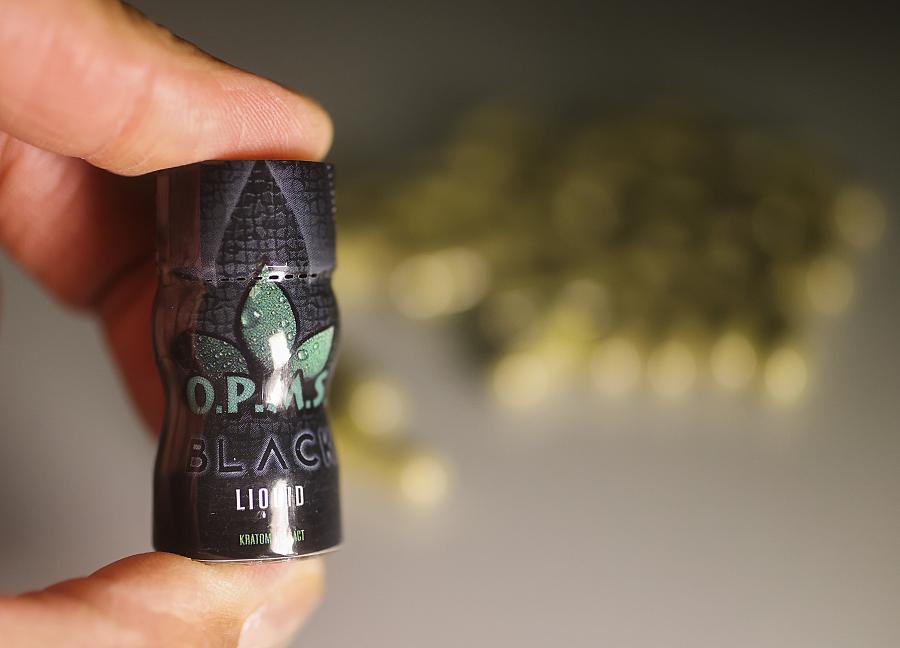
Liquid kratom extracts like this O.P.M.S. product are often packaged into small shots, making them look like mini energy drinks.
DIRK SHADD | Times
At the main location, employees fulfilled orders through Party Nuts, according to four workers. The online wholesale distributor for years has been a go-to way to buy O.P.M.S. products in bulk.
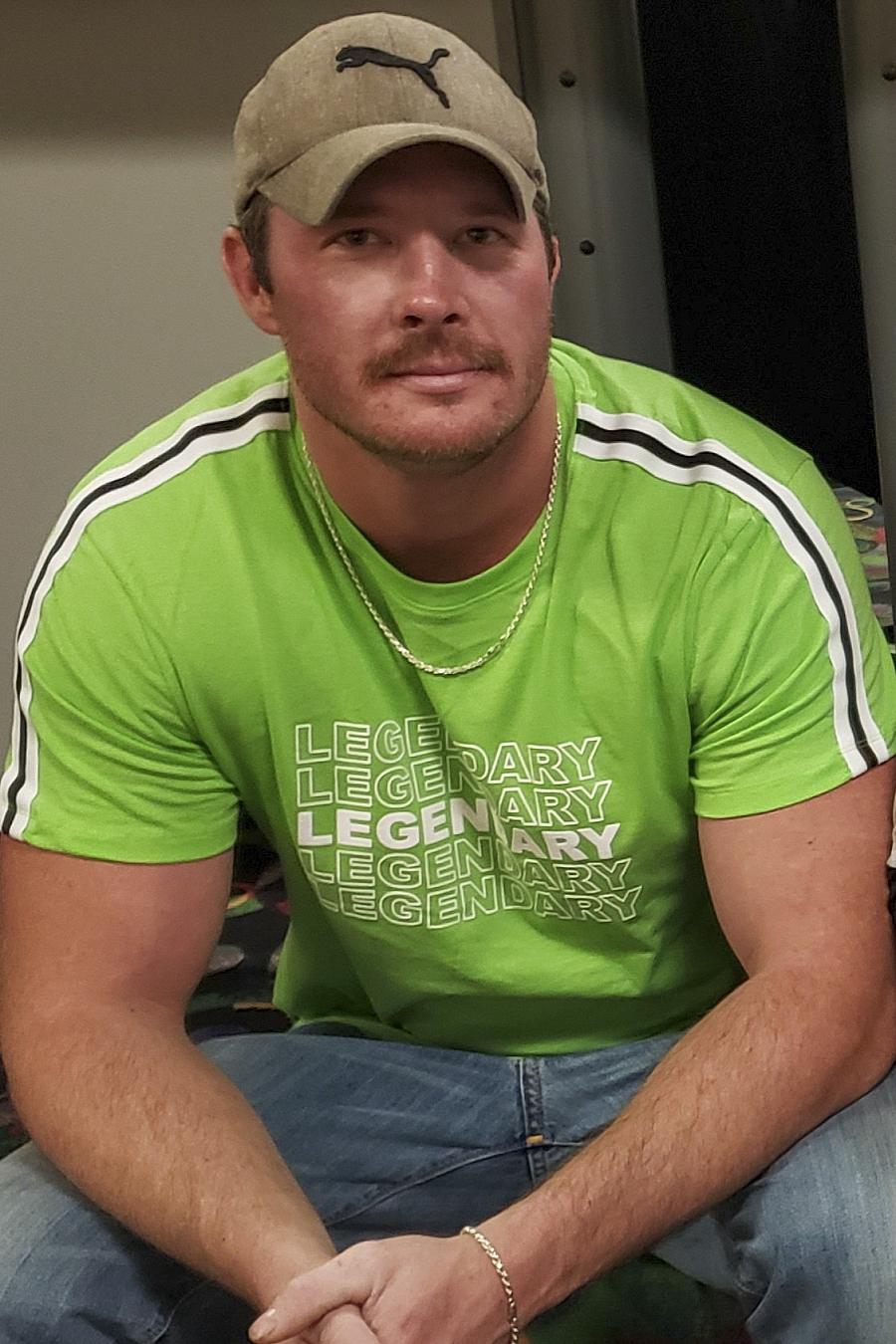
Jeremy Franka was 35 years old when he died from a lethal dose of kratom in his Broward County home.
Courtesy of Barbara Franka
Stores and consumers can’t buy O.P.M.S. products directly from the vendor online, according to the brand’s website. Instead, they must go through a distributor.
Businesses from all over the country bought in bulk, said Taryn Milton, who worked in the warehouse in 2020 and 2021. Milton and other workers assembled O.P.M.S. orders. From there, the products were ready for Florida shelves.
By this point, a typical kratom route exceeded 15,000 miles, more than a third of the journey spent crisscrossing the United States.
The products arrived in gas stations in Tampa Bay. Convenience stores in Miami. Smoke shops in Palm Beach.
There, they landed in the hands of consumers. And started to show up at overdose scenes.
Including the one inside Jeremy Franka’s bedroom.
Franka had just moved into his own Broward County home, eager to start a new chapter, after years in sober living, his mother and father said.
He’d battled addiction since he was 18. Opioids and meth to start, then alcohol.
Eventually, he turned to kratom. He amassed hundreds of powder-filled capsules from a vendor that called itself the “best-selling Kratom Brand in the US.”
He started having seizures, including one that led to convulsions in late spring 2020, his family said. Days later, he was dead.
Inside his room, tucked in a backpack, police discovered the bags of O.P.M.S. Silver.

